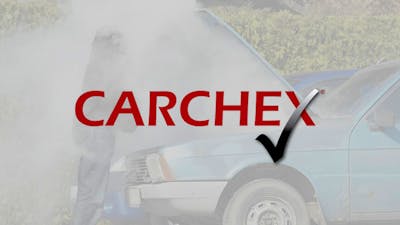
Car Talk’s Understanding Extended Warranties Insider’s Guide gave you the tools you need to make smart decisions on whether to buy an “extended warranty,” more accurately called a vehicle service contract, for your car, and how to pick the right company for your needs. But one thing it doesn’t elaborate on is the laws surrounding the service contract industry in America.

Most Variety in Plan Options

Excellent Plan Options

Great Customer Service
That’s because each state maintains its own service contract laws, which means the legal picture is going to be very different depending on where you live. This state-by-state guide is meant to help you understand the laws covering vehicle service contracts where you live.
One thing that makes the picture a little less complicated than having 50 totally unique legal frameworks for service contracts is that many states have adopted something called the Service Contract Model Act.
That’s a document written by the Service Contract Industry Council, a trade association for the extended warranty industry, and the National Association of Insurance Commissioners. It’s meant to provide a relatively uniform set of laws across the states that adopt it. If you’re curious, you can read the Model Act here.
Call now 1-855-534-1173 or get an online quote

Powered By:
Many states have adopted the Model Act. Usually those states will require the service contract company to provide you with a copy of the contract fairly soon after you buy it. They’ll set a certain number of days you must be given to change your mind and receive a full refund if you haven’t made any claims, sometimes allowing small administrative fees. Usually you’ll get 10 to 20 days, but not always. Florida, for example, gives you 2 months to cancel.
Model Act states will usually expect the company administering the service contract to guarantee them in some way so that if you have to make a claim, there will be money to pay for it. Often that guarantee will be done by the administration company getting a reimbursement policy for the contracts from an insurance company.
Another way for a company to guarantee claims will be paid is by posting a bond with the state, usually a percentage of all the money they take in selling the contracts. If it’s a company with a high net-worth, often in the neighborhood of 100 million bucks, they might not have to separately guarantee the contracts. Model Act states usually also require companies to tell you how the contracts are guaranteed, including the name of the company insuring them if there is one. And they’ll usually mandate that if the administration company can’t or won’t pay a claim, the customer can demand payment directly from that insurance company.
Model Act states often insist that the contract prominently disclose conditions, exemptions, restrictions, and other important details about the claims process, transferring the contract if you sell the car, and how and if the administration company can cancel the contract. They usually also require a disclosure if the plan will use non-factory parts in repairs.
And most Model Act states say that no one, including the bank you get a loan from to buy the car, can require you to buy an extended warranty as a condition of the loan or the purchase of the car.
Where Model Act states tend to differ the most is in punishing companies that break the law. Penalties range from fairly minor fines for each violation, all the way up to serious charges if a company breaks certain parts of the service contract laws. Missouri, for example, can charge anyone who intentionally lies to sell a service contract with a felony, and the punishment can be up to a decade in prison!
As you read the guide to your state’s vehicle service contract laws that affect your extended warranty, keep in mind that laws sometimes use common words to refer to specific things. For instance, throughout these guides we’ve referred to the company that issues and services the contract as the “administrator.” Some states call that company the “provider.” In this guide, the two terms are used interchangeably.
This state-by-state summary is only an incomplete summary. In fact, our lawyers are probably sweating right about now, so we should tell you that it’s not comprehensive, and the people researching and writing this guide aren’t lawyers. Also, laws can be changed, not only by legislative sessions but by court decisions as well. We just don’t have the legal resources to look into every law to make sure nothing’s been overturned.
Because of that, you should consider this guide a starting point, from which to do your own research into laws that affect you. It is, to put it succinctly, not legal advice and you should not rely on it alone for legal research.
Alabama is a state of many firsts. It had the first electric trolley system in the nation. The first stage of the Saturn V rocket which took humans to the Moon was built in Huntsville. And it was among the first states to adopt the Model Act, just 2 years after it was released.
That means Alabamians can expect a number of standard protections when they buy a service contract. They’ll get 10 days from the purchase to change their mind and get a full refund, and that goes up to 20 if they have to wait to see the contract until it’s mailed to them.
Service contract providers must have their policies insured to guarantee the company’s ability to pay, and the name of the insurance company must be stated in the contract. Barring insurance, companies can establish an account with 30% of the income from active contracts, plus place at least 5% of that income, with a minimum of $25,000, into a trust. Companies with a net worth of at least $100 million don’t have to comply with either the deposit or insurance requirements.
Any deductibles that you’ll have to pay must be disclosed in the contract. You must also be told of any exclusions to coverage, and anything you must do to keep the contract in force, such as performing scheduled maintenance. If the extended warranty company wants to use non-original parts to fix your car, they must tell you in the contract. If pre-existing conditions or consequential damages are excluded, that too must be disclosed.
Buying a car or getting a car loan cannot legally be made contingent on your purchase of a service contract in Alabama.
Contract providers breaking Alabama’s extended warranty laws can be barred from conducting further business in the state, as well as fined $500 per violation, up to a total of $10,000 for “similar” violations.
Read full Alabama car warranty laws here.
Alaska is known as bear country, with all three species of North American bears making the state home. If you’re being chased by a polar bear it’s a bad time for your car to break down, and that might make you think about getting a service contract. Alaska’s laws surrounding extended warranties provide a framework that companies selling service contracts have to follow.
Extended warranty companies, both sellers and administrators, have to be licensed by the state. As part of the application process, companies have to prove their contracts comply with state laws and that they’ll be able to pay for covered repairs.
Contract providers in Alaska, like many states, must insure their policies to guarantee they can pay for claims. They can do that with an actual insurance policy, or by keeping ten to fifteen million bucks in the bank, earmarked for covering claims. Very large companies with net worths of $100 million or more are exempt.
Companies have to disclose certain things in their contracts, such as whether or not they’ll fix your car with non-original parts, and whether consequential damage from covered parts is covered. If there will be a deductible you have to pay for service, companies must disclose that in the contract. Anything you must do to keep the contract in effect, such as performing routine maintenance on the vehicle, has to be spelled out.
Contract sellers aren’t allowed to be deceptive, including omitting pertinent information, when selling or writing contracts. They can’t claim to be affiliated with your car’s manufacturer, and they can’t claim to know whether or not your factory warranty is about to expire unless they actually do, and they can’t tell you that you have to buy their service contract to keep your factory warranty in place. Those are all things you’ll commonly hear from unsolicited telemarketers trying to sell you service contracts, and it’s a good sign that those companies aren’t legitimate. You can read more about extended car warranty scams here.
Companies breaking Alaska’s service contract laws can have their license suspended or revoked, and be fined $2,500 per violation, capped at $50,000 for multiple offenses. If the company intentionally broke the law, that fine increases to $5,000, and there is no cap for multiple violations.
Read full Alaska car warranty laws here.
The Grand Canyon State is known for big holes in the ground, from the aforementioned “Big Ditch” to one of the best-preserved meteor craters on the planet. It’s also home to Winslow, a town made famous by The Eagles in their meteoric hit Take It Easy, where the singer stands on a corner and attracts the interest of a lady in a flatbed Ford.
And when that Ford breaks down, if it’s covered by a service contract, that contract is covered by Arizona’s service contract laws.
Companies selling service contracts in Arizona must get a permit. One requirement for being permitted is to prove to the state that the company has the resources to pay for claims. Companies can do that by insuring their contracts, or by filing a surety bond of at least $100,000. If insured, contracts must state the name and address of the insurance company. Anyone selling service contracts who isn’t registered can be charged with a misdemeanor.
Companies selling service contracts have to submit their contracts to the state for approval. They must disclose any deductibles and their amounts, as well as anything that’s excluded from coverage. If non-original parts are to be used in repairs, the contract must say so. Extended warranties must, at minimum, be returnable at any time for a pro-rated refund, minus any claims paid and at most, a 10% administrative fee.
Contracts have to tell you anything you must do to keep them in force, such as performing scheduled maintenance on the car. Pre-existing conditions cannot be excluded unless the service contract company had no way of knowing about them.
Companies breaking Alabama’s service contract laws can have their permit revoked or suspended.
Read full Arizona car warranty laws here.
Home state of Johnny Cash, General Douglas MacArthur, and Walmart, Arkansas is also known for its unusual state law against mispronouncing its name. For the record, it’s “Ar-kan-Saw”. While there aren’t any penalties for pronouncing it “Ar-Kansas,” there are sanctions for companies breaking the state’s laws surrounding service contracts.
Arkansas has several regulations in common with many other states, but the law specifically regulating extended warranties isn’t as fleshed out as you’ll find in other jurisdictions.
Service contract providers must insure their policies to guarantee they can pay claims. They have to disclose pertinent information such as whether or not claims carry a deductible. Any exclusions to coverage must be discussed in the contract. They have to allow customers to change their mind for a refund within the first 30 days of purchase. And buying a car or getting a car loan can’t be made contingent on buying a service contract.
But barring other laws that might cover contracts in general, there’s not much to Arkansas’ service contract provisions. That means if you live in Arkansas, you’ll want to read that contract especially carefully to make sure it meets your needs.
Read full Arkansas car warranty laws here.
California is the state of extremes, from the most damaging earthquakes in the US to the highest mountain peak in the lower 48. And its extended warranty laws are no exception.
In fact, California has two different types of extended warranty laws, each covering a different setup. For the types of service contracts we’ve been talking about, California requires that companies selling them be licensed car dealers. Anyone who is not a licensed dealer who sells extended warranties in California is committing a felony.
California also requires extended warranty administrators to have their own Vehicle Service Contract Provider license, which costs nearly $5,000 to get, and $847 to renew. And they must have a backup insurance company to guarantee claims payment, unless they can show that they have $100 million in assets to guarantee their obligations.
Companies providing vehicle service contracts in California must submit copies of those contracts to the state. Contracts have to be insured to guarantee claims can be paid. The insurance company must score at least a B++ rating from A.M. Best Company. The name and address of the insurance company must be in the contract. Companies worth at least $100 million do not need to comply with the insurance requirement. But they do have to include contact information in the contract to the Department of Insurance, which will receive any breach-of-contract complaints.
Unlicensed companies, or companies that don’t properly insure their contracts, can be fined up to half a million bucks, or charged with a felony. Or both.
Remember, all of that is for “Vehicle Service Contract Providers,” and their contracts can only be legally sold by licensed car dealerships. But there is a third-party seller option in California that’s covered by a different section of the law. That's called “Mechanical Breakdown Insurance” (MBI) which mostly does the same thing as a vehicle service contract as far as paying for covered breakdowns. It’s just regulated as insurance.
You don't have to be a licensed car dealer to sell mechanical breakdown insurance, but you do have to be a licensed insurance seller, and the administration company has to be a licensed insurance provider. Unlike the dealer-sold service contracts, you can buy MBI online.
To the consumer, the big difference between the two types of service contracts other than where you buy them is that, as with any insurance policy, MBI pricing is regulated by the Department of Insurance, while pricing of an extended warranty you get from a car dealership is at the discretion of the seller.
Read full California car warranty laws here.
There is also another good resource here.
The home of Pike’s Peak and its world-famous hill climb race doesn’t have very many laws specifically governing service contracts.
Extended warranties in Colorado have to be backed by an insurance policy, and contracts have to give you the name and address of the insurance company. But other than a ban on deceptive trade practices, there aren’t many laws specific to service contracts in Colorado. There are no codified penalties that we could find for violating those regulations, except that the regulations can be used by wronged consumers when filing civil lawsuits.
This means you’ll want to very carefully read your contract, and make sure that it includes everything you want, and doesn’t exclude anything important.
Read full Colorado car warranty laws here.
Call now 1-855-534-1173 or get an online quote